Position paper: Mandatory sodium reduction targets for processed foods
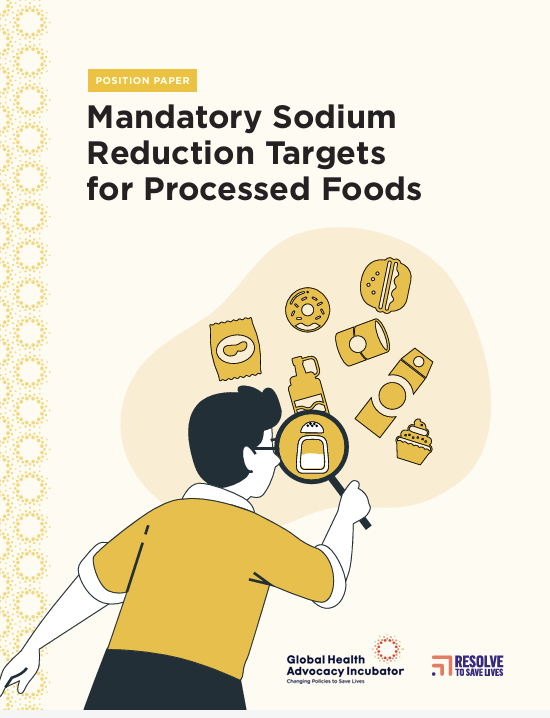
This position paper from Global Health Advocacy Incubator (GHAI) developed in partnership with Resolve to Save Lives, outlines the key steps needed to establish effective mandatory sodium reduction targets, informed by country experiences where these policies have been successfully implemented. It also offers clear, evidence-based recommendations to guide policymakers and advocates in shaping and advancing […]
Front-of-package labeling systems
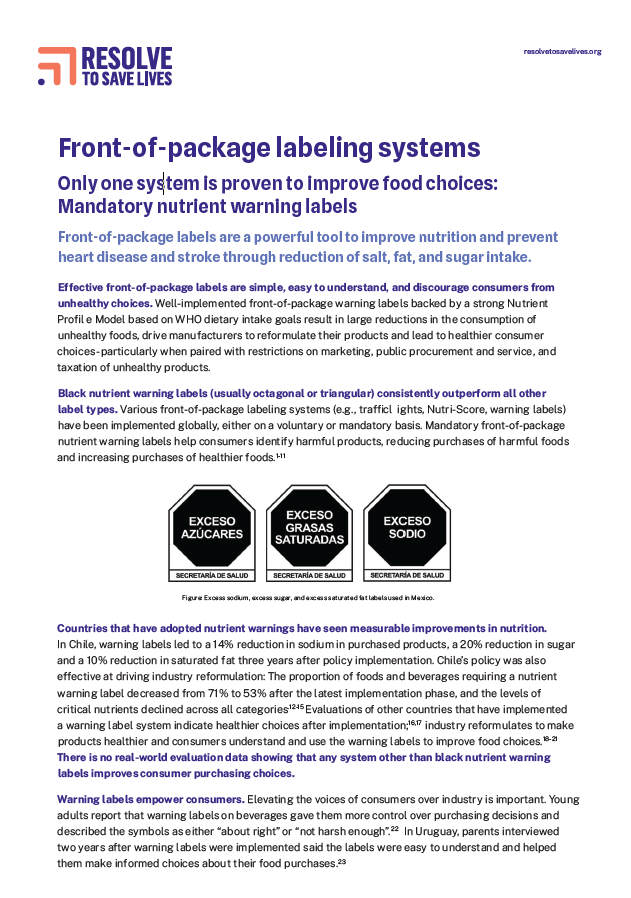
Front-of-package labels (FOPL) are a powerful tool to improve nutrition and prevent heart disease and stroke through reduction of salt, fat, and sugar intake. Only one system is proven to improve food choices: Mandatory nutrient warning labels.
Lower-sodium salt substitutes: Frequently asked questions
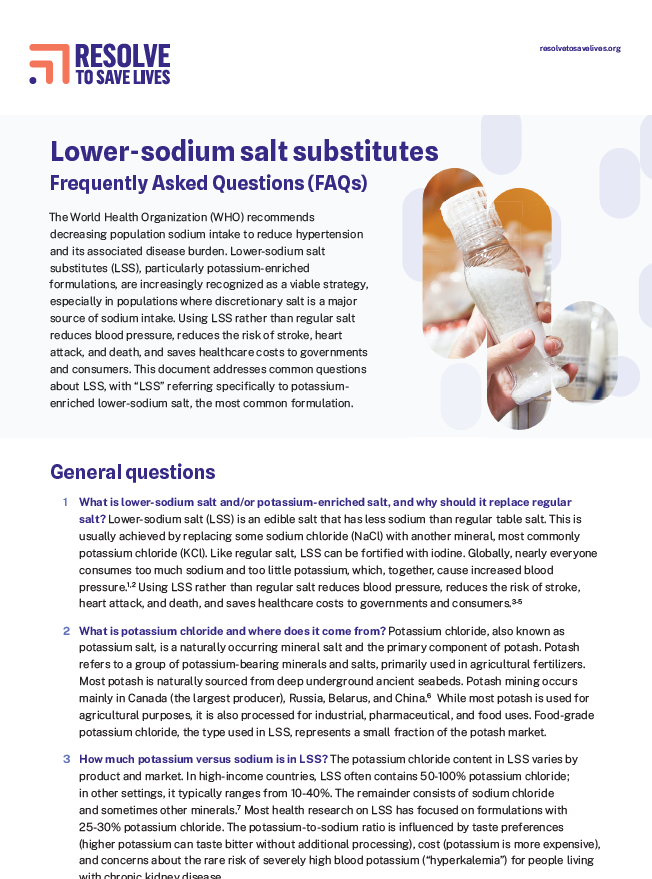
FAQ about lower-sodium salt substitutes (LSS)—an important part of a comprehensive sodium reduction package.
Policy brief: Front-of-package warning labels give consumers the freedom to choose healthy
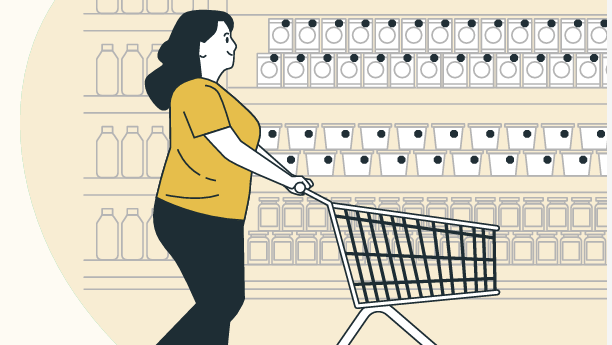
This policy brief developed by Global Health Advocacy Incubator (GHAI) and Resolve to Save Lives highlights the critical role of mandatory front-of-package warning labeling (FOPL or FOPWL) in combating diet-related noncommunicable diseases (NCDs) such as diabetes, cardiovascular diseases, and obesity and saving millions in health care costs. Warning labels empower consumers with easy-to-understand nutrition information […]
Using nutrient profile models to underpin key nutrition interventions
New RTSL guide explores how to use nutrient profile models to rank food based on nutritional composition and provide the scientific foundation for healthy and comprehensive nutrition policies.
Guide to developing nutrition standards

Nutrition standards guide developed by Resolve to Save Lives that governments can use to ensure food and beverages purchased, served and/or sold in government settings such as schools, public hospitals, childcare or child development facilities, correctional facilities and government workplaces are healthy and low in sodium.
Fourth time a charm?—How to make the UN high-level meeting on noncommunicable diseases effective
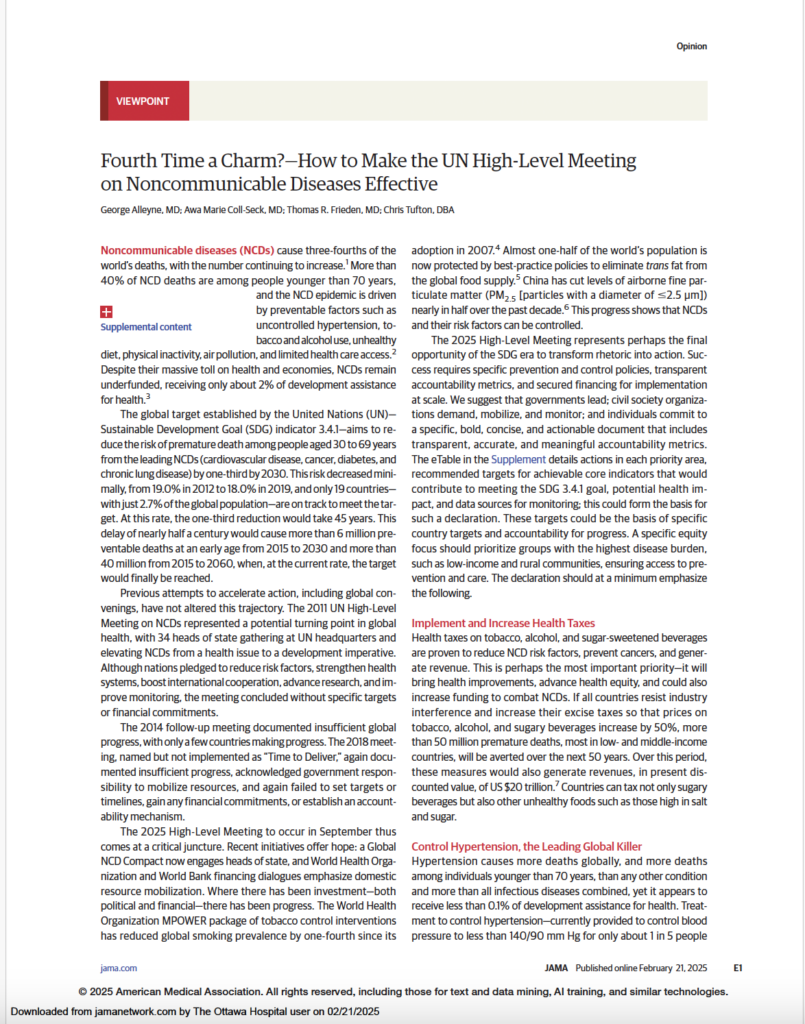
In a new article published in the Journal of the American Medical Association (JAMA), Dr. Tom Frieden and colleagues call for a focused strategy and more investment to address the world’s leading killer diseases. The article outlines specific, effective, and measurable steps countries can take to make progress and increase the chances that the upcoming […]
Use of lower-sodium salt substitutes: WHO guideline
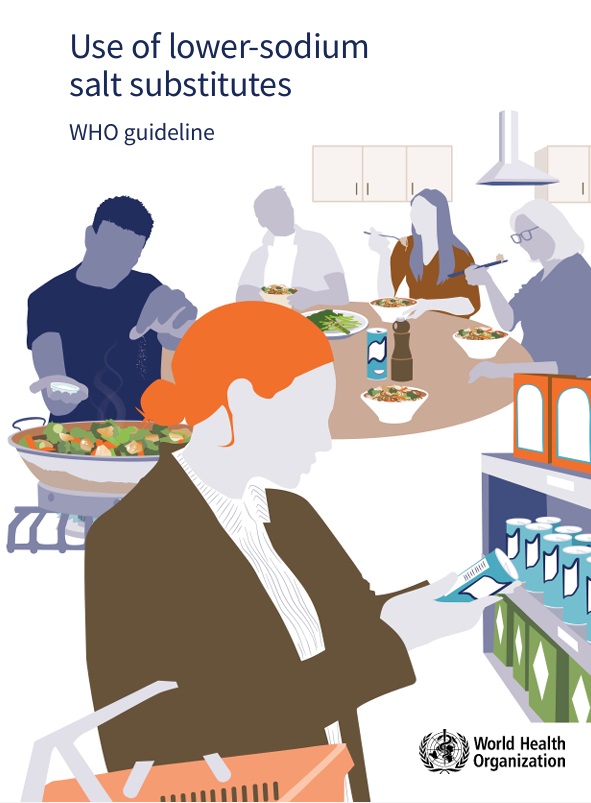
Just switching from regular salt to low-sodium alternatives can save lives. WHO now recommends this life-saving strategy pioneered by Resolve to Save Lives to reduce salt intake and its associated health risks.
Webinar: using data on packaged food to drive policy change and save lives
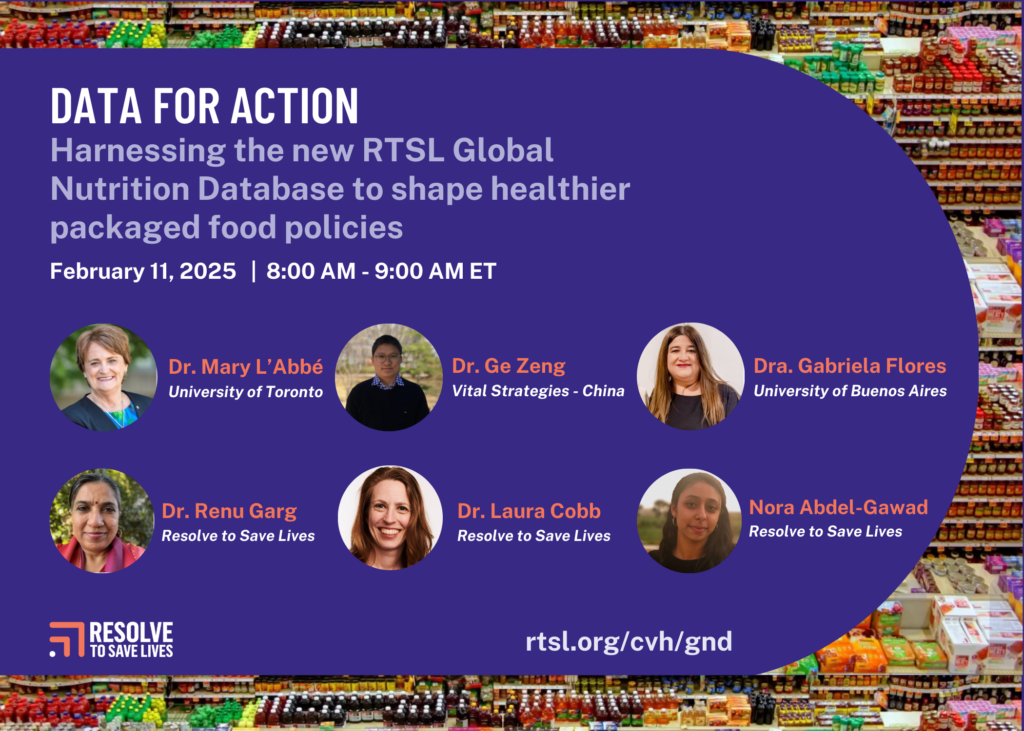
The only resource of its kind, Resolve to Save Lives’ (RTSL) new and improved Global Nutrition Database now includes 55 datasets covering the sugar, sodium, and saturated fat content of packaged foods from 36 countries. The updated database provides more detailed information on national packaged food policies in each country, as well as the updated […]
WHO recommends lower-sodium, potassium-enriched salt in place of table salt
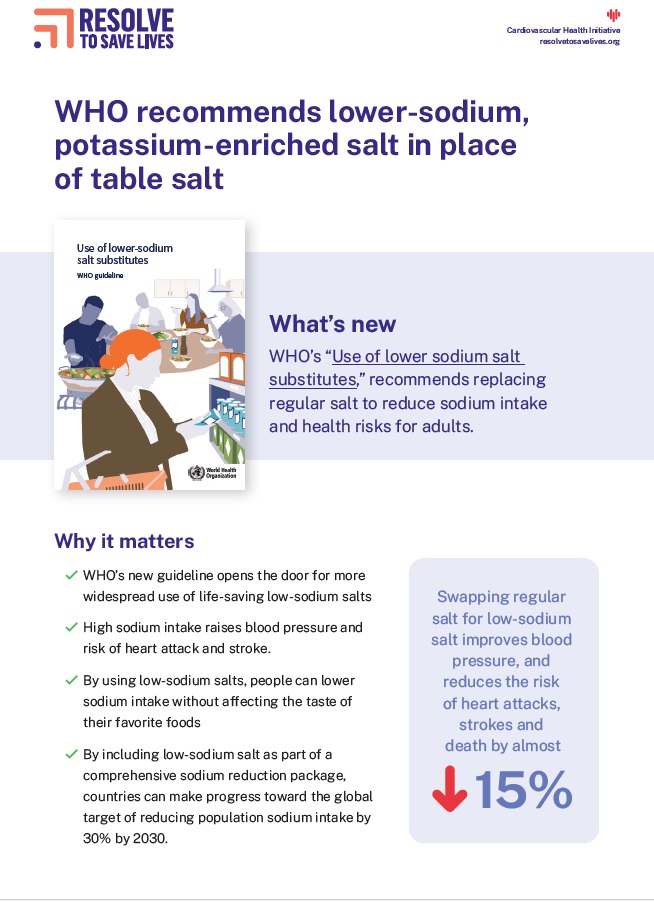
Infographic from Resolve to Save Lives highlighting key points from “Use of lower-sodium salt substitutes: WHO guideline,” why it matters, and what it means for countries.
Tools for the Assessment of the Public Food Procurement and Policy Landscape
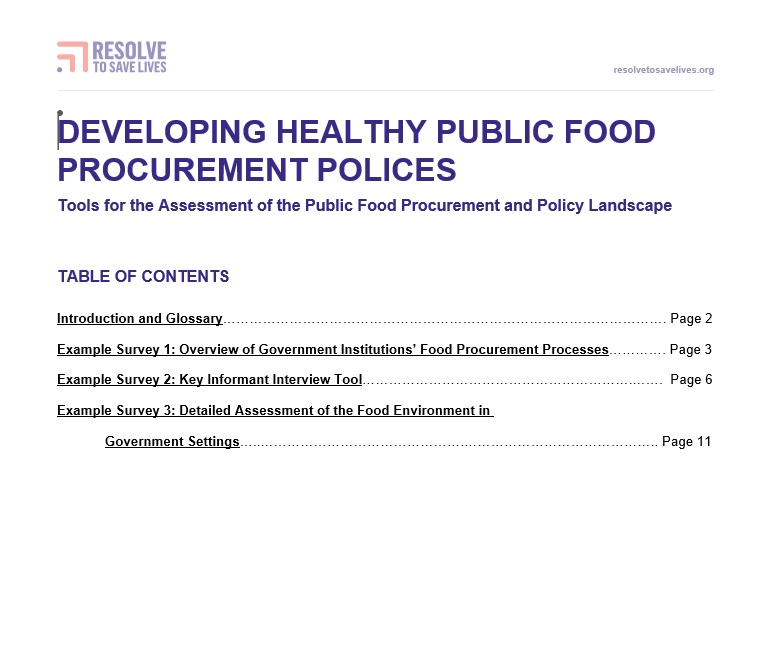
A comprehensive assessment of the existing food procurement landscape is crucial to the development, implementation, and evaluation of a healthy public food procurement policy that is relevant to the specific context. Resolve to Save Lives has developed example surveys for capturing key aspects of the food procurement and policy landscape. These surveys should be adapted […]
Lower sodium, longer lives

Sodium reduction is the single most important dietary intervention for improving heart health and saving lives. Learn more in this resource developed by Resolve to Save Lives.
Designing Front-of-Package Labels to Inform Consumers and Encourage Healthier Food Choices in Bangladesh: A Qualitative Study

This study, co-authored by the RTSL nutrition team, uses focus groups of consumers in Bangladesh to better understand purchasing decisions and effectiveness of nutrition labels. Chief food purchase concerns include that a food has sufficient beneficial nutrients, is free from germs or toxins, and does not contain high levels of nutrients of concern. Results suggest […]
Global overview of government-endorsed nutrition labeling policies of packaged foods: a document review

Clear and accurate nutrition labeling on food products is an important way for consumers to understand what’s in the foods they buy. This new comprehensive review in Frontiers led by partners at the National Heart Foundation of Bangladesh and co-authored by Resolve to Save Lives shows that governments are scaling up action to help consumers make informed food […]
FOPWL regulations around the globe
Overview of front-of-package warning labelling policies around the world developed by GHAI
Countering Industry Interference: Food Industry Watch Resources

Centralized location for industry alerts, policy briefs, and reports to help organizations stay up-to-date on the ultra-processed food and beverage industry.
Reducing Demand for Unhealthy Food: Resources

Collection of advocacy resources on various health food policies such as Front-of-Package Warning Labels, Marketing Restrictions, Sugar-Sweetened Beverage Taxes, and Trans fatty Acids Eliminations.
Advocacy Action Guide Four Phases to Health Policy Success

Guide developed by the Global Health Advocacy Incubator (GHAI) to provide public health advocates with strategies, case studies, and lessons from over 40 countries to plan, organize, and implement effective advocacy for health policy outcomes.
NOURISHING Database

The NOURISHING database, built on the NOURISHING policy framework, offers a comprehensive set of policies to guide policymakers, researchers, and civil society in promoting healthy diets and combating obesity and NCDs across ten key action areas.
RTSL Global Nutrition Database for Packaged Foods

Provides centralized access to category level nutrient data for packaged foods sold around the world
Getting Fiscal Policies Right: Lessons and recommendations across NCD risk factors

NCD report highlighting common best practice fiscal policies consistent with NCD prevention as well as measures that are recommended as highly effective in reducing the enormous strain of NCDs.
Lower Sodium, Longer Lives in India
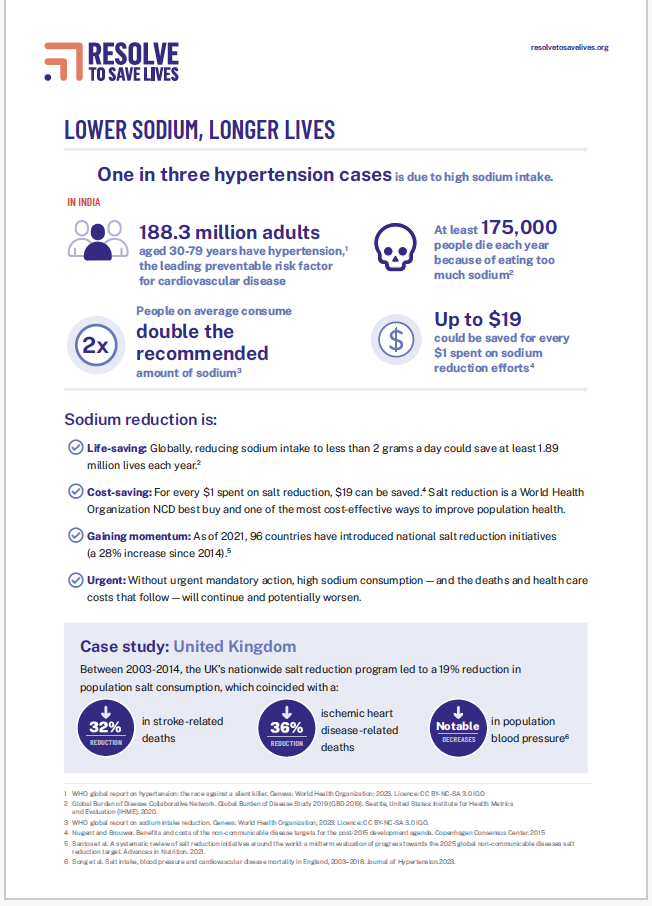
Sodium reduction is the single most important dietary intervention for improving heart health and saving lives in India. Learn more in this resource developed by Resolve to Save Lives.
Addressing Unhealthy Diets in India
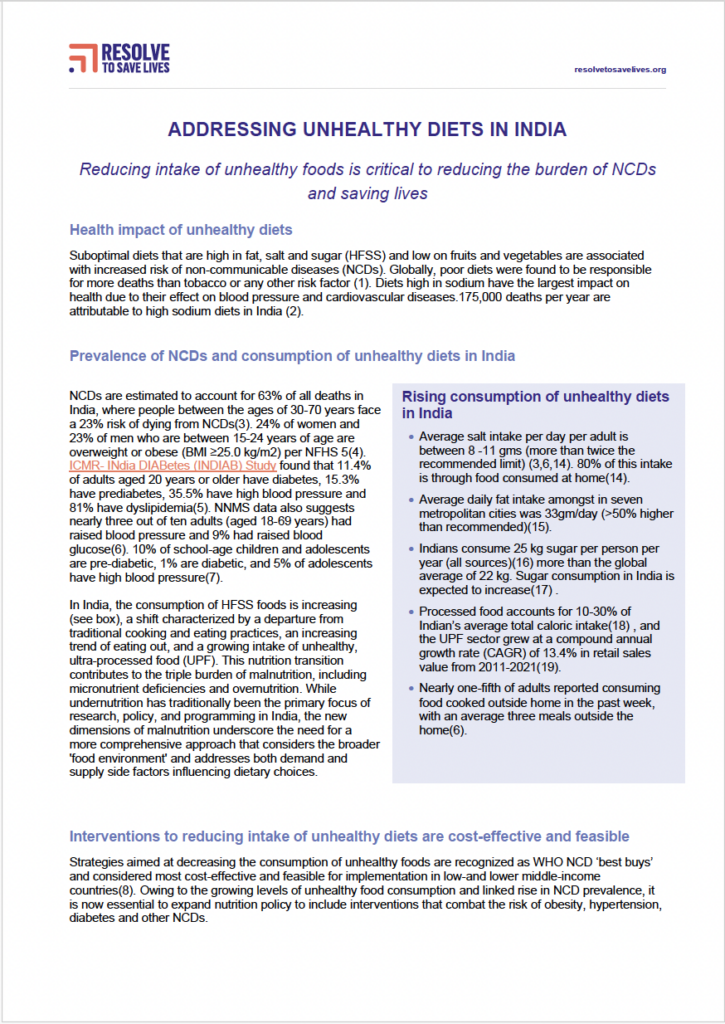
Learn more about Resolve to Save Lives’ comprehensive, cost-effective interventions to promote healthier diets and save lives in India.
Fiscal policies to promote healthy diets: WHO guideline

A WHO guideline offering Member States recommendations on implementing fiscal policies, such as taxes and subsidies, to promote healthy diets by influencing consumer behavior through price adjustments at the retail level.
Virtual Course: Regulatory Policies to Prevent Obesity and Diet-related Noncommunicable Diseases

Virtual course developed by PAHO aiming to strengthen capacity to design and advance effective regulatory policies that reduce the demand for and offer of ultra-processed and processed products to prevent obesity and diet-related NCDs in the Region of the Americas.
Global sodium reduction strategies course
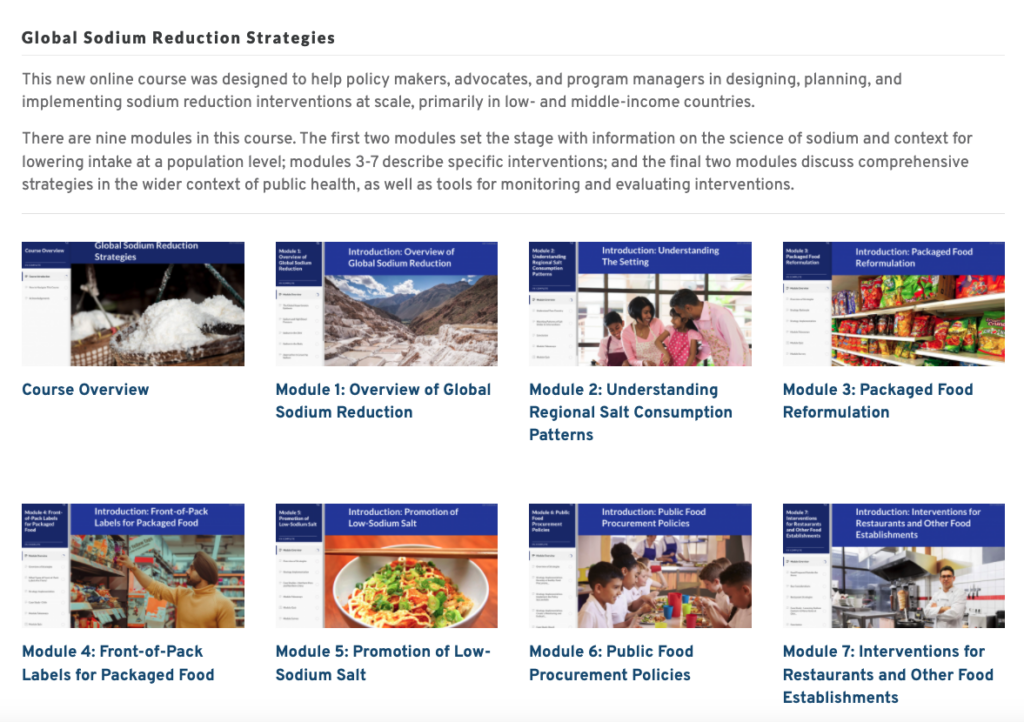
A nine-module online course to help policy makers and health advocates design, plan, and implement global sodium reduction interventions at low- and middle-income countries
Tackling NCDs: best buys and other recommended interventions for the prevention and control of noncommunicable diseases, 2nd ed

WHO’s updated list of “best buys” and recommended interventions for addressing NCDs, aligned with the extended Global Action Plan (2013–2030) to help countries achieve the nine voluntary NCD targets and advance SDG 3 on good health and well-being.
Saving lives through comprehensive sodium reduction

A six-step guide developed by Resolve to Save Lives that governments can follow to help reduce sodium consumption at the national level.
Increasing uptake of low-sodium salt

Fact sheet highlighting the addition of low-sodium salt to one’s diet to reduce blood pressure and associated risk of heart attack or stroke.
Nutrient Profile Models: A valuable tool for developing healthy food policies

Position paper from GHAI, Resolve to Save Lives and other partners presenting best practices for defining, selecting and using effective NPMs.